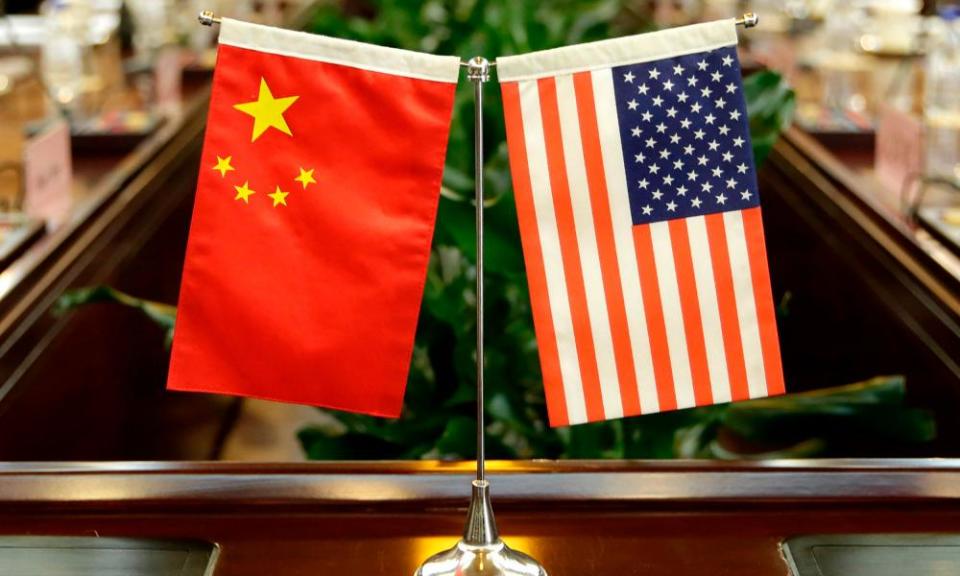Hotlines ‘ring out’: China’s military crisis strategy needs rethink, says Biden Asia chief

The Biden administration’s top Asia official has warned about the absence of a crisis-communications channel between the US and China at a time of rising military tensions over Taiwan and the South China Sea.
Military and leadership hotlines have been established at various points in the fraught history of the relationship, but Kurt Campbell, the White House Asia “tsar” responsible for coordinating policy across the administration, said Beijing had shown no interest in using them, out of a preference for uncertainty. The hotline simply rings out in “empty rooms”, he said.
The Chinese leader, Xi Jinping, has continued to test the nerves of Taiwan and its allies, stepping up incursions into the island democracy’s airspace with its warplanes, and staging combat exercises ever closer to the territory.
Friction also remains high in the South China Sea, where the US carries out freedom of navigation patrols with its warships through territorial waters that are unilaterally claimed by Beijing.

“I believe there is a general worry of miscalculation, and of incidents and accidents, and I do not think there are effective procedures with China to head these off,” Campbell, White House coordinator for the Indo-Pacific, told the Guardian.
Related: China v Russia v America: is 2021 the year Orwell’s 1984 comes true?
“China has generally resisted any effective efforts at these kinds of confidence-building, crisis management procedures. In the past, the hotlines that have been set up have just rung, kind of endlessly in empty rooms. So the Chinese have chosen not to go in that direction.”
“At the same time that they are ramping up these military activities in proximity to US and allied forces, they’ve done so without any kind of guardrails or reassurance mechanisms,” Campbell said.
Hotlines between military and civilian leadership was a safety feature of the rivalry between the US and the Soviet Union during the cold war. But as China’s military might has risen in relation to Russia’s, efforts to establish enduring lines of crisis communications between Washington and Beijing have failed.
President Bill Clinton and General Secretary Jiang Zemin, agreed to establish a hotline in 1997, but it was never put to proper use, even when Nato accidentally bombed the Chinese embassy in Belgrade in 1999.
In 2014 Barack Obama and Xi agreed a memorandum of understanding on the rules of behaviour in maritime and aerial encounters. In an annex to that agreement the following year, the two countries said they would establish a “military crisis notification mechanism” for audio and video defence links “in order to reduce risk, foster mutual trust, and increase openness”.
But Campbell said Beijing has not made use of the channel.
“For a host of reasons, the Chinese have been reluctant to engage deeply in these efforts. China has different calculations on the proper conduct of civil military relations,” he said in a telephone interview. “They fear that by establishing these mechanisms they give credence and legitimacy to American military exercises and operations near their borders and they don’t want to do that.”
“Even during the cold war, we had much more effective crisis communications between the United States and the Soviet Union,” he said. “As China’s capacity has grown considerably and they operate globally – they are now a near-peer military power – I think they need to rethink their previous ambivalence about some of these mechanisms. That’s an area we want to explore with them as we go forward.”
Caitlin Talmadge, associate professor at Georgetown University’s foreign service school, said that Campbell was right to be concerned about the lack of sustained communications with an assertive, rising military power.
“I would agree with Kurt that the lack of working crisis communications channels, as well as a broader lack of in-depth regular strategic dialogue, is a serious problem in the US-China relationship,” Talmadge said. “It raises the odds of miscalculation and escalation, particularly over Taiwan. Both sides need to understand the other’s red lines and would benefit from establishing mechanisms for an off-ramp in the event of a crisis or war.”
Campbell confirmed earlier this week that the new administration would not change the US policy of “strategic ambiguity” on Taiwan, meaning Washington would not make clear if, and under what circumstances, it would come to the country’s defence.
Since establishing diplomatic relations with Beijing in 1978, official US policy is that there is just “one China”, despite the fact that Taiwan operates as a completely independent country. The bargain with the Communist leadership was that as long as this protocol was maintained, peaceful reunification was theoretically possible and invasion was unnecessary.
The Biden administration, however, is pursuing its predecessor’s lead in steadily boosting its support for Taiwan. Biden invited Taiwan’s envoy to his inauguration, the first US president to do so in over 40 years. In April, Washington lifted more restrictions on contacts with Taiwanese officials.
Campbell indicated that the administration was prepared to take the next step in pushing for Taiwanese recognition on the world stage, supporting its representation on global bodies such as the World Health Authority (WHA), the governing body of the World Health Organization.
“I think there are opportunities for Taiwan to enjoy greater international space under appropriate guidelines,” he said. “We would support Taiwan’s greater participation in a number of venues, including, engagement in the WHA, given the enormous success that Taiwan has enjoyed with respect to dealing with Covid. They have much of value to share with others.”

 Yahoo News
Yahoo News 